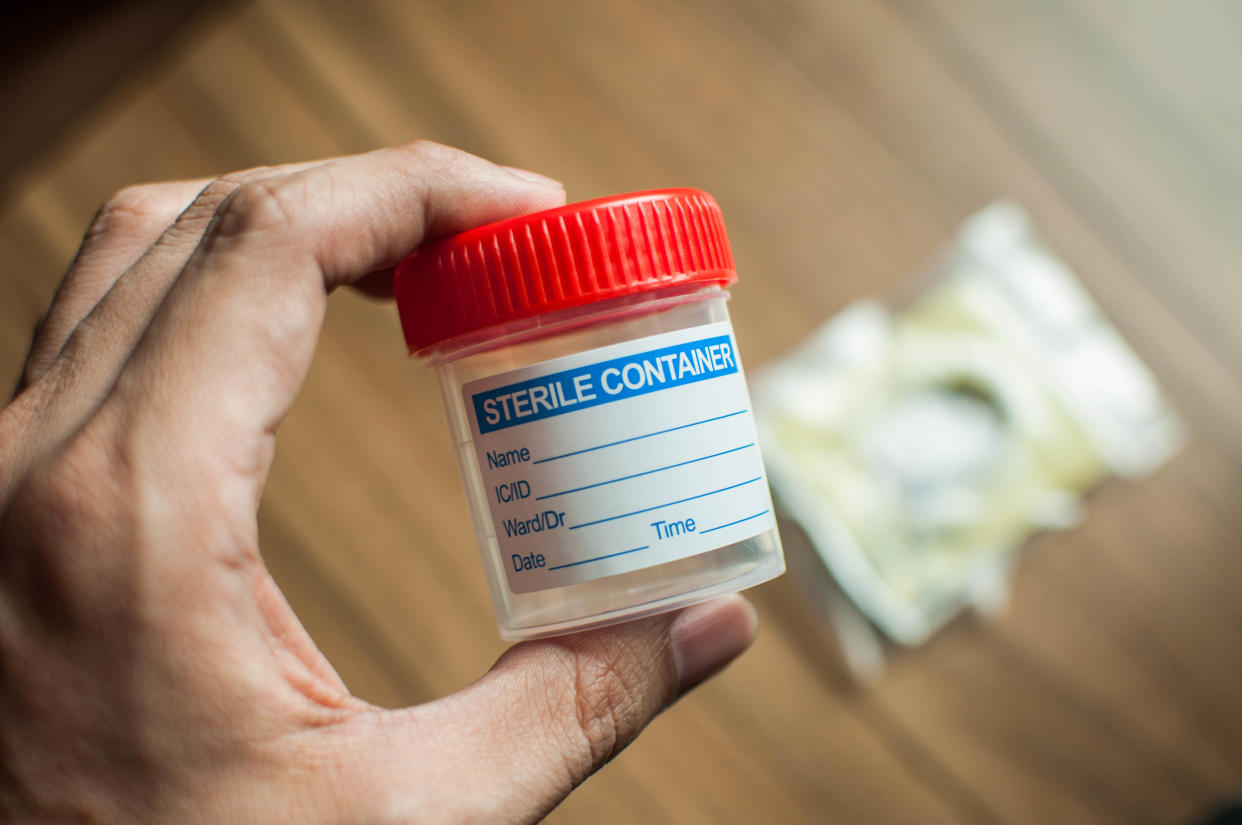At-home urine test could 'revolutionise' how prostate cancer is diagnosed

An at-home urine test could “revolutionise” how prostate cancer is diagnosed, scientists have said.
A team from the University of East Anglia created a Prostate Urine Risk (PUR) kit that looks for the expression of certain genes in liquid waste.
READ MORE: Sir Rod Stewart tells men to check for prostate cancer
After putting it to the test in 14 patients, they found the kit showed “biomarkers for prostate cancer much more clearly than a rectal examination”, the current first-step in diagnosis.
It also reportedly “predicts” whether men require treatment, allowing low-risk patients to avoid unnecessary therapies that come with a host of nasty side effects.
Critics argue, however, the so-called benefits are “misleading” and the study “too small to draw any conclusions”.
“Being able to simply provide a urine sample at home and post a sample off for analysis could really revolutionise diagnosis,” lead author Dr Jeremy Clark said.
Prostate cancer affected 47,740 new men between 2014 and 2016 in the UK, Cancer Research UK statistics show.
In the US, 174,650 men are expected to be diagnosed by the end of the year, according to the American Cancer Society.
There is no screening programme for the disease because “it has not been proved the benefits outweigh the risks”, the NHS reports.
Men over 50 in the UK can opt to have their protein specific antigen (PSA) levels tested, however, this is controversial.
Many prostate tumours are slowing growing and non-aggressive. In these cases, the drawbacks of treatment - like erectile dysfunction and urinary incontinence - may outweigh any benefits.
READ MORE: Immunotherapy gives hope for 'incurable' prostate cancer
“Prostate cancer is the most common cancer in men in the UK,” Dr Clark said.
“It usually develops slowly and the majority of cancers will not require treatment in a man's lifetime.
“However, doctors struggle to predict which tumours will become aggressive, making it hard to decide on treatment for many men.
“We developed the PUR test, which looks at gene expression in urine samples and provides vital information about whether a cancer is aggressive or 'low risk'.”
To check its effectiveness, men attending Norfolk and Norwich University Hospital urology clinics were asked to use the test on their first urine of the day.
“Because the prostate is constantly secreting, the collection of urine from men's first urination of the day means the biomarker levels from the prostate are much higher and more consistent”, Dr Clark said.
These results were compared against urine samples collected after a digital rectal examination, which involves a medic inserting a finger up a man’s anus to check the size and texture of his prostate.
This was “thought necessary to boost levels of prostatic secretions in the urine”, the scientists wrote in the journal BioTechniques.
“We found the urine samples taken at home showed the biomarkers for prostate cancer much more clearly than after a rectal examination,” Dr Clark said.
“Using our at-home test could revolutionise how those on 'active surveillance' are monitored for disease progression, with men only having to visit the clinic for a positive urine result.”
Active surveillance monitors early prostate cancer that has not spread, according to Prostate Cancer UK. It means men often do not have treatment unless the cancer grows, to avoid side effects.
“[In] the current situation, men are recalled to the clinic every six-to-12 months for painful and expensive biopsies,” Dr Clark said.
“[And] because the PUR test accurately predicts aggressive prostate cancer, and whether patients will require treatment up to five years earlier than standard methods, a negative test could enable men to be retested every two-to-three years, relieving stress to the patient and reducing hospital workload.”
READ MORE: Proton therapy for prostate cancer: does the evidence support the hype?
The East Anglian scientists worked alongside Norfolk and Norwich University Hospital, which receives more than 800 prostate cancer referrals a year.
“When we do diagnose prostate cancer, the urine test has the potential to differentiate those who need to have treatment from those who do not need treatment, which would be invaluable,” study author Dr Robert Mills said.
“This urine test has the potential to tell us whether we needed to intervene with these patients.”
However, not everyone is convinced.
Dr Mangesh Thorat, from King's College London, said: “This is misleading and overstates the case.
“This small study evaluated ‘at-home urine sample collection using specific kit’ versus ‘standard urine sample collected in clinic’ in 14 patients for detection of urine-based biomarkers.
“These biomarkers, although promising and an area of active research, are not yet recommended for screening or during management of prostate cancer by active surveillance.
“Therefore, these findings do not have any clinical or public health implications.”
Professor Justin Stebbing, from Imperial College London, added: “A test that can replace a hospital or doctor-based examination is important, but this study is too small right now to draw any conclusions, but can provide the basis of future clinical testing in a study to evaluate these questions.”


